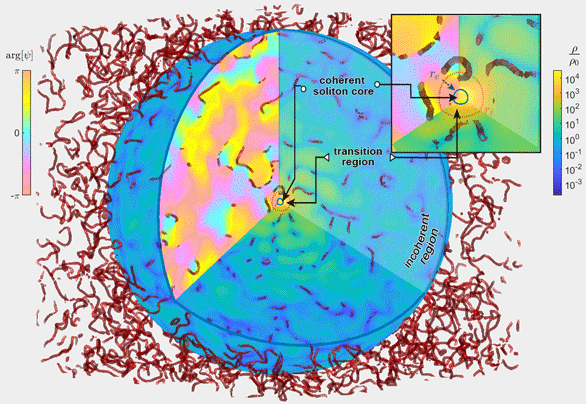
An exotic, ultracold state of matter on Earth is helping scientists study the behavior of "fuzzy" dark matter.
Dark matter is an invisible form of matter that makes up about 85% of the matter in the universe, yet scientists aren't sure what it's made of. One idea, so-called fuzzy dark matter, suggests that dark matter comprises tiny particles that exhibit wave-like behavior.
Now, researchers have used an exotic state of matter to mimic fuzzy dark matter here on Earth. To create this state of matter, called a Bose-Einstein condensate (BEC), scientists cooled atoms to near absolute zero so they combined into a single quantum mechanical entity that can be described as a wave.
Related: If dark matter is 'invisible,' how do we know it exists?
The research team found that BECs resembled the physical state at the cores of fuzzy dark matter "halos" — gravitationally bound structures in which galaxies, including the Milky Way, are theorized to form.
"Fuzzy dark matter has been studied already for a few years now by cosmologists, but our work has applied concepts from the study of BEC dynamics, which has been around for much longer," Gerasimos Rigopoulos, a senior lecturer in applied mathematics and theoretical physics at Newcastle University in the U.K. and co-author of the study, said in a statement. "We now understand that there are specific similarities with BECs, and the ultimate goal is to use this knowledge to devise ways for better testing this new and exciting model observationally."
The team also found turbulent vortices and fluctuations that prevented coherence across the halos.
This separates fuzzy dark matter from other dark matter candidates, like axions and weakly interacting massive particles (WIMPs), which are considered "cold dark matter," so called because it is believed to move more slowly than the speed of light.

Rather than relying on gravity, as cosmology does, ultracold atomic physics describes the behavior of clouds of atoms such as rubidium, potassium and sodium gases, typically at millionths of a degree above absolute zero, to monitor quantum effects. To show that fuzzy dark matter essentially acts as a giant BEC, the team had to mimic gravitational attraction on a cosmic scale in the laboratory.
"I have always kept an open eye for interdisciplinary approaches in physics, and this has been a perfect problem to tackle from such an angle," Rigopoulos said. "Establishing a common language took some time, but we could see from the beginning, even as we conceived this project, that there were rewards to be reaped when you go out of your comfort zone and try to see things from a new perspective."
The achievement is promising for future attempts to create laboratory settings that replicate aspects of matter distribution in the universe on a smaller scale, said Nikolaos Proukakis, a professor of quantum physics at Newcastle University and co-author of the study. The team's future work will focus on studying the theoretical properties of fuzzy dark matter to place the BEC-like model under scrutiny.
"Even as a theoretical playground, it is fantastic to have a new system to model, trying out extensive expertise gained from laboratory condensates, and hoping for future observational tests in cosmology," Proukakis said in the statement.
The research is published in the journal Monthly Notices of the Royal Astronomical Society.







